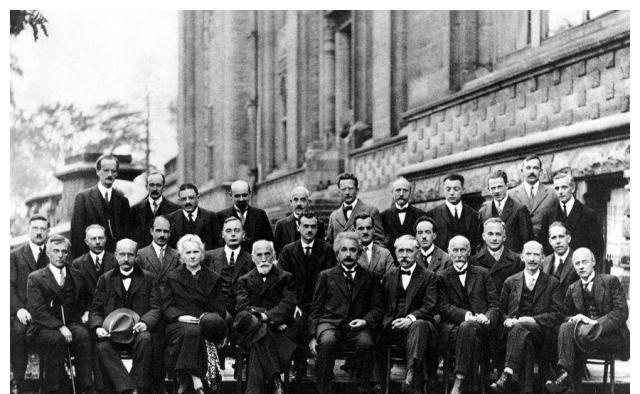Many scientists embraced theology in their later years?
Many people especially like to use the phrase "scientists study theology in their later years" to illustrate that theology is superior to science. Even on the Internet there is a popular "theology at the end of science." Let's leave aside what's wrong with that. Let's start with the study of theology by scientists in their later years. Nothing spread most widely than Einstein's belief in Buddhism in his later years, and Newton's study of theology in his later years. Let's start with Einstein.

Einstein believed in Buddhism?
If we look closely at the record of this claim, in the end, we will find the opposite result. That is to say, Einstein once commented on Buddhism, but he never said that he believed in Buddhism.
Later, many people rumored that Einstein believed in Buddhism, but in fact it was all fabricated, and no one could produce direct evidence. Instead, Einstein was an outspoken atheist, which is well represented in his biographies and diaries.
Of course, you might say, Einstein also said: God does not roll dice.
This is actually the explanation he uses to refute quantum mechanics, thinking that the "uncertainty principle" is too regular. And "God" here refers to the absolutely objective truth that Einstein believed in, and he believed that there was such a truth, and this truth was actually the great unified theory of physics. Einstein spent his later years working to find the theory, but ultimately failed.
Therefore, in his later years, Einstein's study was not theology at all, but physics.
Newton studied theology in his later years?
Many people say that "Newton was obsessed with the study of theology in his later years", but in fact they did not know anything about Newton's time. Newton was an Englishman more than 300 years ago. At that time, all of Western Europe was religious, and the newborns were baptized. In Newton's time, the anglican church was Anrigan, a branch of Protestantism. Most of the countries in southern Western Europe are Catholic. Therefore, in that era, the people of Western Europe embraced Christianity as if Chinese and in ancient times it was one thing to worship Confucianism.
Newton had been a Christian since childhood, but he had embraced Aliouism, a minority sect denounced as heretical by mainstream Christianity, so Newton had been reluctant to expose his religious beliefs.
Therefore, Newton did not believe in theology in his later years, but people simply believed in religion from an early age. Of course, Newton did study theology, but he did not study it in his later years, he studied it all the time. In front of Newton's tombstone there is a statue of him, and there are 4 books in this statue, representing four of Newton's works, one of which is called Chronology, which is actually Newton's work on theology. Newton didn't just study theology, he actually studied alchemy. Throughout his life, he studied a wide range of fields, in addition to the above two, he even engaged in finance and politics, which were the focus of his later years.
If we look at that era, we know that it is normal for Newton to be like this. Because, it was an era of theology, and the shadow of science was not yet there. If you ask What Newton did. His answer would be: natural philosopher. And this natural philosophy includes a wide variety of disciplines. That's why Newton's field of study is so vast. Therefore, Newton was not old at all, and felt that science was unreliable, so he studied theology. Therefore, it is very unreliable to use Newton to prove that theology is stronger than science.
、
In fact, if you look closely at Tesla's life, you will find that Tesla was engaged in theoretical physics in his later years, and he also made a lot of theories, but this part of the content was not recognized by the mainstream academic circles, and later it was not resolved.
So what is the relationship between science and theology?
Science and theology
First, science and theology are actually advocating completely different worldviews. The scientific paradigm and the theological paradigm are two completely different things, and no one is more intelligent than anyone else. You can't expect every scientist to find theology reasonable, after all, theology is an authoritative science, and science is anti-authority.
Nor can you expect all theologians to understand relativity and quantum mechanics. So, the so-called "theology at the end of science" is actually the wishful thinking of many people. The basis of science is mathematics, experimentation, logic. Science cannot end up scrapping its foundations. Moreover, this statement itself is very unscientific, because science has not reached the end, how do you know what the "end of science" is?
Not only that, but science and theology are not opposites, you can choose to believe in science, you can also have religious beliefs, and you can certainly believe in both.
Are there any scientists who are religious?
Actually, a lot, and someone has actually interviewed these people, and through the interviews we find that these scientists don't actually think theology and science are in conflict, that in their worldview, the two are independent of each other.
Some have even done surveys to see what percentage of scientists are religious. Among them, among the many disciplines, the most religious believers are mathematicians, and about 14.3% believe in God. From this, we can also see that even the highest proportion of mathematicians is only 14.3%, and even fewer other groups of scientists.
Therefore, theology and science itself are not in conflict, and you can choose to believe in one of them, and you can believe in both. According to the current survey results, the vast majority of scientists are atheists.